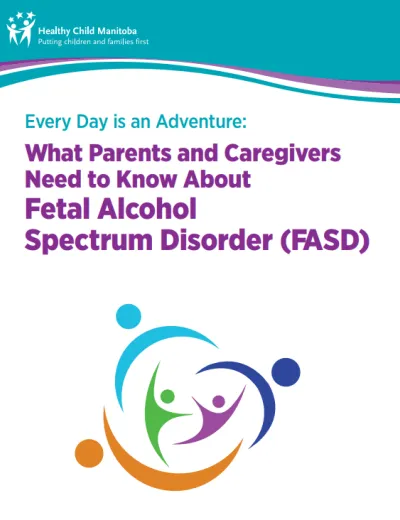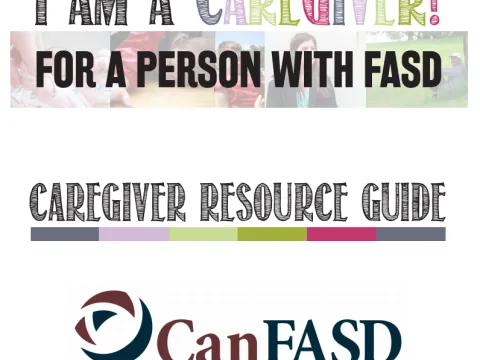Parenting any child is both challenging and rewarding.
Every child with FASD has their own special set of strengths as well as their own challenges. Too often people focus on the child’s disability instead of appreciating the whole person. It is important that parents of a child with FASD learn about the disability, and get support for managing their child’s brain differences. One significant way to help is by providing a stable, nurturing environment.
As parents and caregivers, we expect children to learn and behave in certain ways based on their age. Children and youth with FASD are often at a younger age of development in a number of areas than others their age. If we can adjust our expectations and “think younger” for a child with FASD, it may help to reduce frustration on all sides and improve outcomes.
It is also important to remember that people with FASD may have had more harmful childhood experiences than those without FASD (such as being exposed to domestic violence or abuse).
One well known study found that the impact of having FASD can be reduced by:
- having a diagnosis before age 6
- being in a stable, nurturing home
- using special needs services
- having basic needs met
- having no experience of violence against themselves
Building on strengths and tackling challenges
It is very helpful to identify the strengths and talents in children with FASD while working to improve the areas of difficulty. A good starting place is to use the information in the diagnostic assessment. If you focus on strengths, it will help others see and appreciate your child as a whole person, as well as improve your child’s self-esteem.
- Start by identifying your child’s strengths, talents and potential interests. Begin to include these in everyday tasks. Examples include: raking the lawn, shoveling snow, looking up directions on the computer.
- Use words that are positive and strength-based when thinking about solutions or working with your child.
- What does my child do well?
- Saying “I believe in you.”
- How can I support my child when they are struggling?
- Help your child discover what they are able to do. Encourage your child to take part in everyday activities.
- Think ahead to the challenges your child might face in an upcoming situation and plan ways to lessen these challenges (this is called anticipatory parenting).
- Identify what some of your child’s specific challenges are, and work with your child as well as your care team to come up with solutions that work for your child.
Supports for people with FASD and their families/caregivers
An early diagnosis can help lessen the disabilities related to FASD. It is a lifelong condition, and people with FASD will need supports for their entire lives. The kind of support needed will change as the person ages.
Younger children with FASD may benefit from:
- mental health support
- speech and language therapy
- occupational therapy
- educational supports
As people with FASD grow older, their mental health concerns may become more serious if left untreated. They may also experience difficulty at school and in social settings. Some may run into problems with the law.
Youth and adults may benefit from:
- drug and alcohol counselling
- employment training
- a case manager and school counsellor
- support with daily activities of daily living:
Medication
There is no medication for treatment of FASD itself. But some medications can help with some of the mental health challenges that are more common with FASD. It is important to have a discussion with your child’s doctor so you understand the possible risks and benefits of these medications.
Supporting Parents and Caregivers raising children with FASD
Parenting in general can be hard work. Parenting a child with FASD can be very demanding and exhausting. Parents and caregivers may feel frustrated, disappointed, and sad as they work to support their children as best they can. It is important to make sure you make time for yourself to refresh and reset so you can be fully present as a loving parent or caregiver.
Look after your own physical needs – get enough sleep, eat well, and exercise. Spend time with people who give you emotional support. Remember the interests you had before parenting a child with FASD and spend time enjoying them again (sports, music, art, etc.). Stay informed about FASD. Join committees that work to raise awareness of FASD in schools and within social services. Look for support groups and connect with others who are on a similar journey.
A Note on Grief and Loss
It is normal for caregivers and family members to have feelings of grief, loss and guilt along their journey with FASD.
No parent sets out to cause harm to their children. People drink alcohol for various reasons and to different degrees. Often, mothers are not aware that they are pregnant until several weeks after conception and have, unknowingly, exposed their unborn child to alcohol. Once a mother knows she is pregnant, she should stop drinking alcohol as every day without alcohol makes a difference.
The feeling of loss for what “could have been” for the child can be overwhelming. Try to adjust your hopes to focus on your child’s strengths, and develop realistic goals. That can help you to shift from a negative to a more positive, productive path.
It is important for you to recognize these feelings and seek support and help. Your own physical and emotional health is crucial to being the best parent possible for your child.






